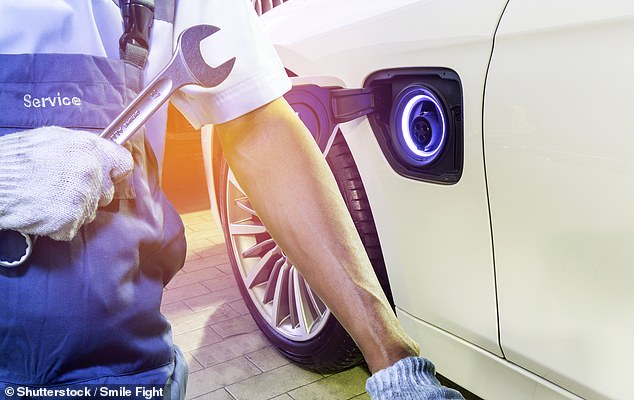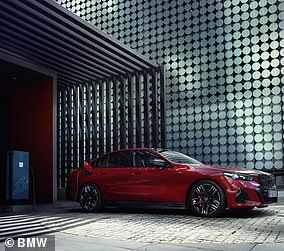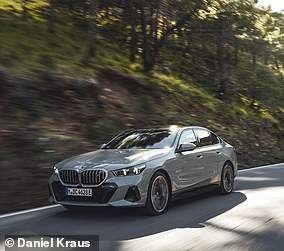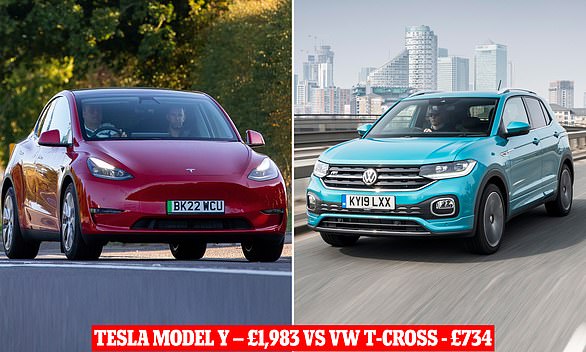There is a general consensus that electric vehicles (EVs) have cheaper servicing and maintenance costs than petrol and diesel cars because there are fewer moving parts to go wrong.
But is this always the case? New analysis by valuations experts Cap Hpi suggests not.
It compared costs quoted by manufacturers for the latest EV models and similar cars with combustion engines – and the numbers might surprise you.

EVs are cheaper than petrols and diesels to service, maintain and repair because there are fewer moving parts – true or false? Cap Hpi has ran the numbers…
Cap Hpi is responsible for forecasting service, maintenance and repair (SMR) costs – as well as total cost of ownership – for fleets, finance providers and insurance companies.
This is to give businesses a clearer understanding of the financial implications of running different vehicles, especially when it comes to varying fuel types.
The figures are sourced directly from the car manufacturers and from the global provider of vehicle lifecycles costs, Solera.
It has looked at the SMR costs based on a three-year ownership period – which is a typical lifecycle of a fleet model or a new car taken out on finance by consumers.
It found the current average price for a servicing an EV – excluding VAT – over three years is £299.
For a diesel, the cost is £493, while petrols are typically the most expensive, costing £624 – more than double that of an electric alternative.
However, further analysis carried out by Cap Hpi found SMR costs can vary depending on the models being compared side-by-side, especially when you take into account running diagnostics, replacing headlight bulbs and replacing other consumable parts.
In fact, when pitting six different EV example against their petrol or diesel alternatives, two electric cars worked out more expensive to run.
Steve Chambers, senior editor for SMR at Cap Hpi, said: ‘Diesel servicing costs across all currently on sale models are on average 60 per cent more than BEVs, with petrol models over double that of BEVs.
‘The main difference in direct service costs is down to the removal of oil, air and fuel filters.
‘With EVs, there are obviously no spark plugs to contend with and at higher mileages and ages, no troublesome timing belts and chains to consider.’
Service and maintenance costs compared: EV vs ICE
The following comparisons are SMR costs over a three-year, 30,000-mile period for new cars and pricing is without VAT included. It doesn’t include additional running costs such as electricity/fuel, tax and insurance.
The first example given is the all-new BMW 5 Series versus the electric i5 – models that are just starting to arrive in the UK having been unveiled earlier this year.
For servicing costs only (not including a BMW servicing pack), Cap Hpi estimates the i5 will cost £271, while a petrol 5 Series is £346.
For one with a diesel engine, BMW quotes an average service cost of £843 – more than three times the EV.
However, add more maintenance costs to the equation, and the affordability of EVs isn’t as favourable.
For an electric VW ID.3 hatchback, the manufacturer quotes a total cost – including servicing, tyres, brakes and others (which covers MOTs, costs for diagnostics, headlamp adjustments, batteries, exhausts, bulbs as needed) – over three years is £1,050.
For an equivalent Golf diesel, the total rings in at £615 over three years.
This is despite the servicing of the combustion model being higher and – as in all cases listed – braking components often do no need replacing within the first three years because they are used less thanks to EVs having regenerative braking systems to recharge their batteries.
The reason the ID.3 is more expensive overall is mostly due to its tyres, which are around four times pricier.
EV tyres are different to conventional car rubber because they need to support the extra weight of batteries.
This means they require stronger belts to reinforce them, which comes at a cost.
EV tyres are also specifically designed to have quieter rolling noise – this is due to their silent drivetrains amplifying road rumble compared to a petrol or diesel cars.
It’s a similar case when you pin a Tesla Model Y versus a VW T-Cross.
The electric Tesla is £1,893 to maintain and service for 36 months compared to £736 for the petrol Volkswagen. This again is predominantly a result of higher tyres prices for EVs.
However, when comparing a Vauxhall Corsa-e against a Corsa with a petrol or diesel engine, the electric variant is much cheaper to keep running at £688 compared to £1,071 for the diesel and £1,190 for the petrol.
A Tesla Model 3 against a BMW 3 Series petrol also found that the EV was almost £200 cheaper to maintain.
‘The service and maintenance costs across several new vehicle variants make for an interesting comparison,’ Steve explains to us.
‘With no BMW service package included, forcing the i5 and 5 series onto parts and labour-based pricing, it is clear that BEV models are significantly cheaper to run than their ICE counterparts.
‘At 30,000 miles, the i5 only needs a service at 24 months, whereas the petrol model requires servicing at 18,000 miles and the diesel at 15,000 miles.
‘While the EV and petrol models may have the same service count, they don’t need the same level of parts and fluids.’
However, when including other factors, including brakes and tyres, the difference in forecast SMR costs is reduced and – in some instances – reversed.
‘Outside of servicing, tyres are the main cost area for drivers, with EV tyres typically more expensive as they become worn sooner than ICE equivalents, mainly due to vehicle weight.
‘In addition, EVs, on average have larger or less common tyre sizes that are more expensive.
‘There are numerous factors to consider in all of this, but fundamentally, when it comes to service and maintenance costs, EV models are outperforming ICE equivalents and do cost less to run.
‘The question is whether or not drivers will feel it that much if they are doing very low mileage.’
What about the cost to keep an older EV running, we hear you ask?
Cap Hpi has also run the numbers on a Kia Niro Electric versus a Niro petrol hybrid.
The calculation is based on three year ownership of cars that are two years old and showing 20,000 miles on the clock.
And it’s the EV that’s the more affordable of the two, costing £1,277 to service, maintain and repair compared to £1,371 for years two to five.
Some links in this article may be affiliate links. If you click on them we may earn a small commission. That helps us fund This Is Money, and keep it free to use. We do not write articles to promote products. We do not allow any commercial relationship to affect our editorial independence.










